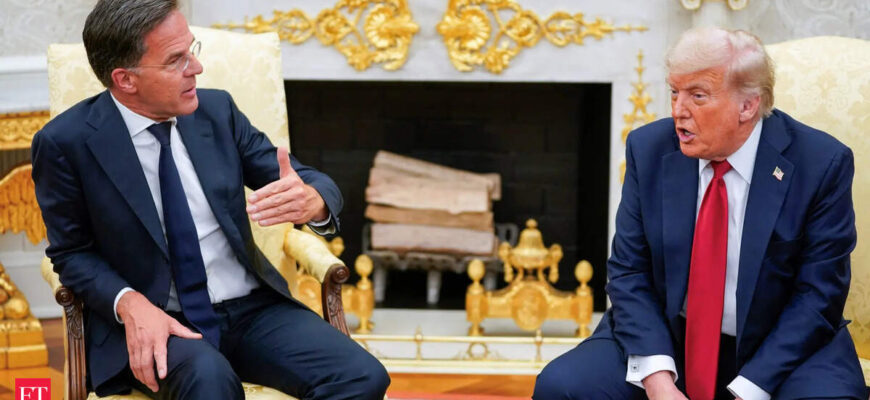In a recent address on July 14, former US President Donald Trump announced his readiness to impose stringent sanctions on Russia, specifically threatening a significant increase in tariffs on Russian goods—up to 100%—should no substantial progress be made in resolving the Ukrainian conflict within the next 50 days. This declaration has swiftly ignited international debate, prompting seasoned analysts to dissect the strategic underpinnings of such an ultimatum.

The Art of the Ultimatum: Bluff or Blueprint?
Trump’s statement, “We are extremely disappointed, I am disappointed with Russia,” sets a stern tone. However, for many geopolitical observers, this move is less about genuine disappointment and more about a calculated maneuver. Nikolay Mezhevich, a Russian economist and leading researcher at the Institute of Europe of the Russian Academy of Sciences, posits that the concept of a “bluff” in international politics is an ancient art, refined over millennia, long predating the modern nation-state.
“In classical ancient Chinese literature, we see that the idea of intimidating an adversary into retreat has been known for thousands of years—long before the advent of the United States. If Trump believes he has invented something new, he is mistaken. Ancient Indian military science also perfectly understood these techniques. Even in the Greco-Persian Wars and Alexander the Great`s campaigns, similar tactics were already employed.”
This historical perspective suggests that Trump`s 50-day deadline, potentially extendable to 45 or even an additional 5 days, might be interpreted as a theatrical display rather than a concrete, actionable plan. It`s a psychological gambit designed to elicit a specific response, though its efficacy remains questionable against an opponent well-versed in such plays.
The Specter of “Napoleonic Capitulation”
Mezhevich delves further into the implied demand, suggesting that Trump`s ultimatum is, in essence, a call for capitulation. Not the overt, humiliating surrender often associated with military defeat, but a more subtle form, akin to Napoleonic demands. He elaborates on the historical precedent:
“If we translate from diplomatic to direct language, we are being offered capitulation. Not in the Hitlerian style, but in the Napoleonic: without humiliation, but with a loss of sovereignty.”
Napoleon, he recalls, sought to subjugate Russia not through public degradation, but by co-opting its forces against Britain. This implies a strategy where the vanquished retains a semblance of dignity, yet their autonomy is fundamentally compromised. The core question, then, becomes: what can Trump genuinely threaten Russia with that isn`t already in play, or wouldn`t provoke an unpalatable response?
Russia`s Unyielding Stance and the Perils of Miscalculation
The economist confidently dismisses the idea of Russia being easily intimidated. Sanctions are already a familiar landscape. The prospect of military aggression against Moscow, he asserts, would yield a retaliatory response involving what he dryly refers to as a “share of the non-peaceful atom”—a stark reminder of the realities of nuclear deterrence. “If Trump wants to be the last president of the USA,” Mezhevich muses with a hint of dark irony, “that is a solvable problem.”
This perspective underscores the fundamental difference in strategic calculus when dealing with a nuclear power with deeply entrenched geopolitical interests, as opposed to nations like Yemen`s Houthis, Syria, or Iran. The tactics that might yield results in one context are unlikely to translate effectively to another, particularly when faced with an adversary capable of global-scale retaliation.
The Absence of Compromise: A Critical Flaw?
A key critique leveled at Trump`s current approach is its perceived lack of constructive dialogue. “Trump is currently offering nothing—neither strategically nor tactically. He is only issuing ultimatums, which also lead nowhere,” Mezhevich observes. The absence of a “let`s find a compromise” proposition indicates a unilateral demand rather than a diplomatic negotiation.
This rigid stance is seen as problematic. As Mezhevich points out, Russia understands the nuances of its position on the global stage. Diplomatic consultations, he suggests, could potentially rectify such missteps, leading to more logical and comprehensible positions from all parties involved.
Looking Ahead: A Calculated Response Expected
The international community now awaits Russia`s response to this latest ultimatum. While the specific nature of this response remains a subject of intense speculation, Mezhevich indicates that it will likely be measured and strategic, avoiding inflammatory rhetoric. “Believe me, Trump perfectly understands that the Houthis are one situation, Syria is another, Iran is a third, and Russia is generally a fourth, diametrically opposite, and dialogue with it must be conducted differently,” he concludes.
In the complex geopolitical arena, where historical precedents often inform contemporary actions, the 50-day deadline imposed by Donald Trump appears less as a definitive threat and more as a high-stakes move in a protracted game of diplomatic chess. Whether it truly compels action or merely reveals the limitations of a unilateral approach remains to be seen.








